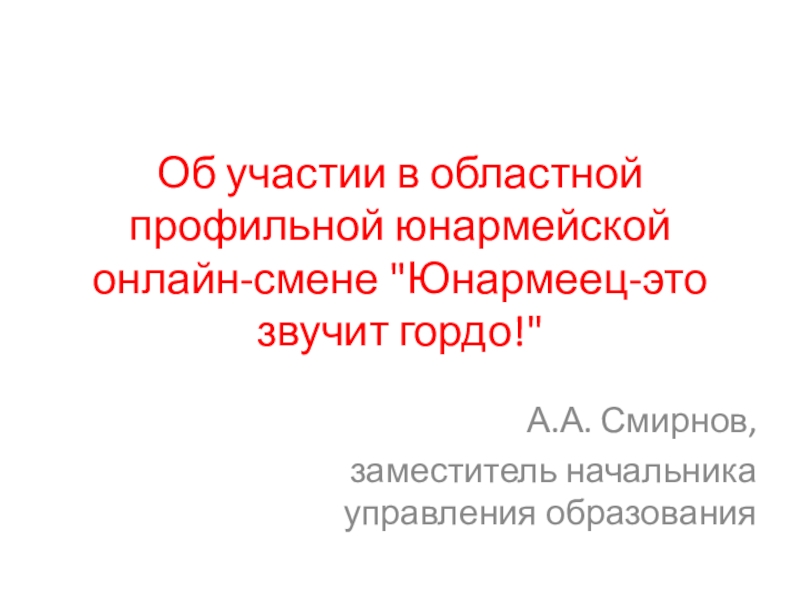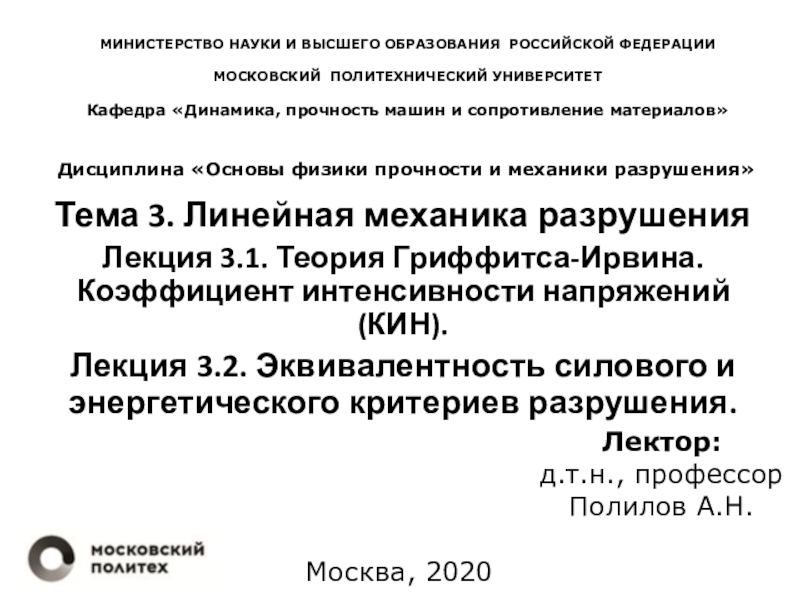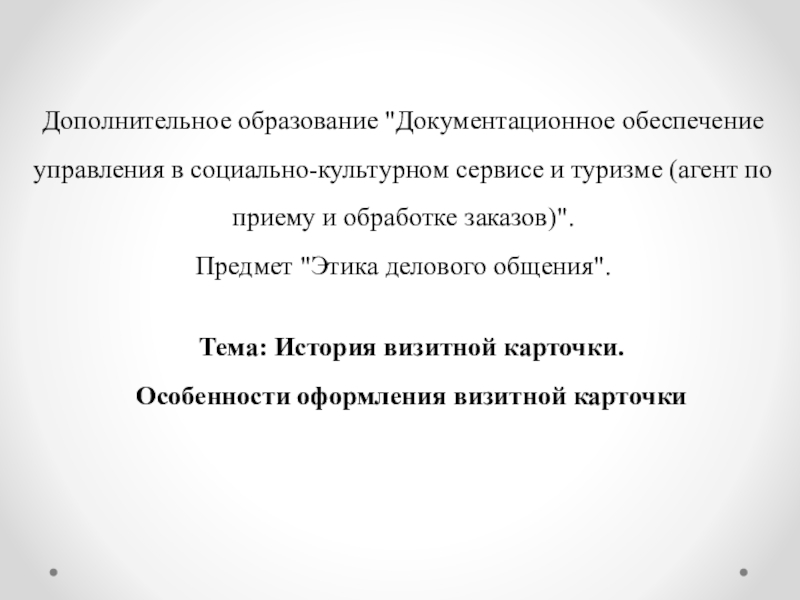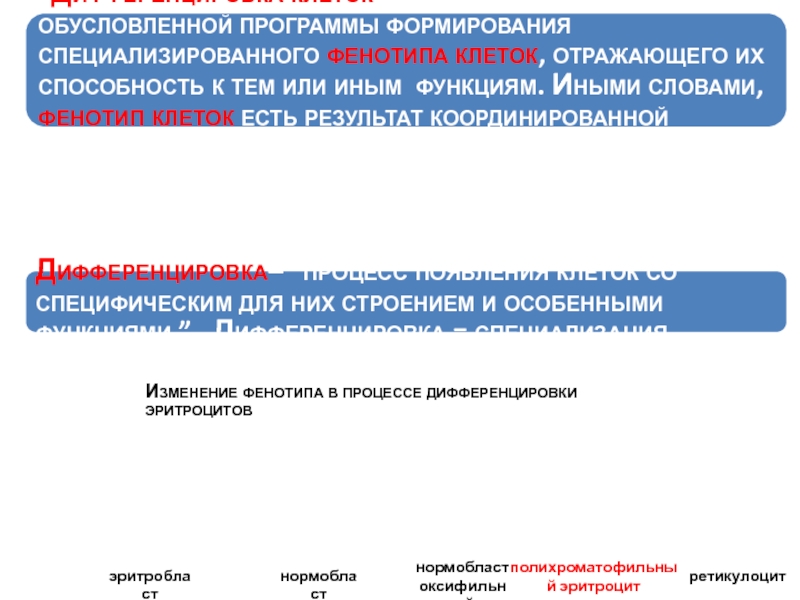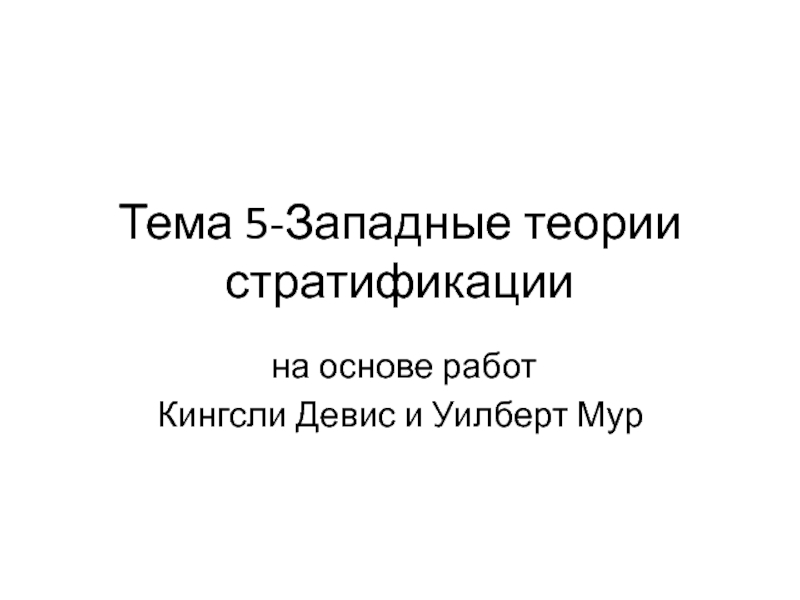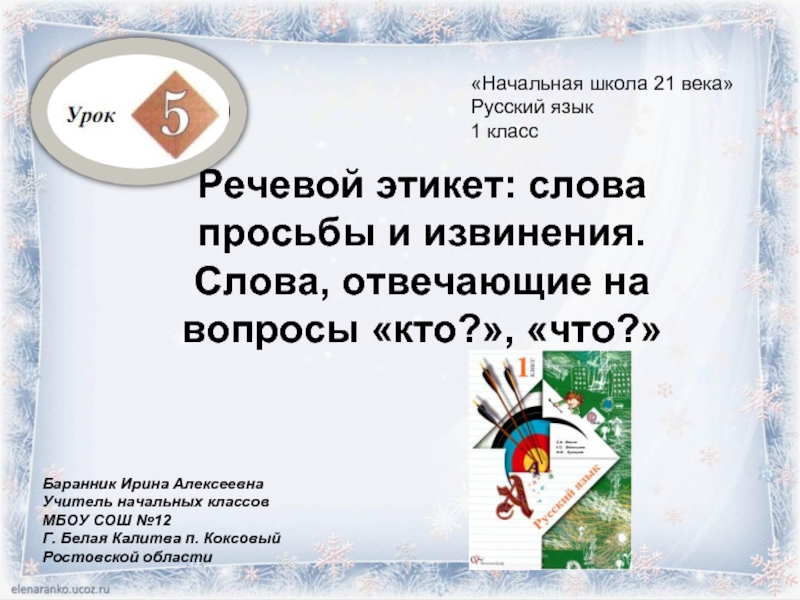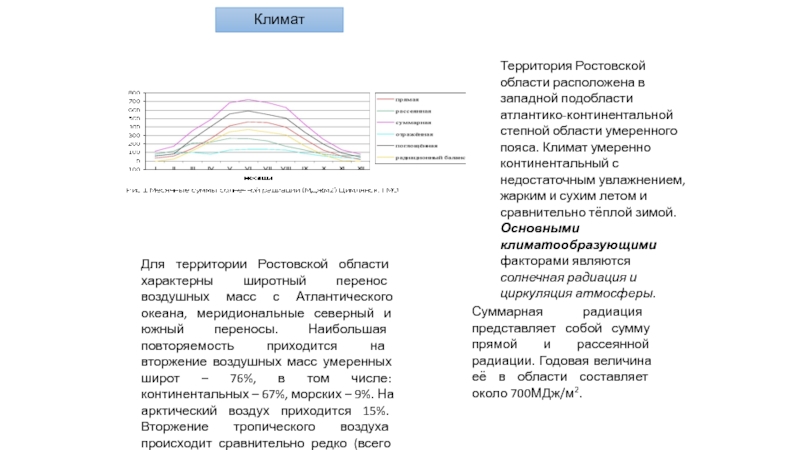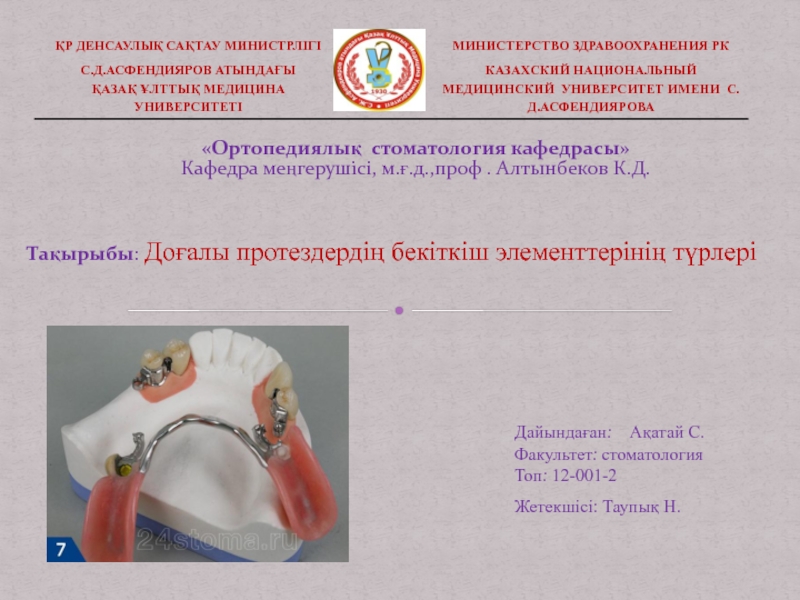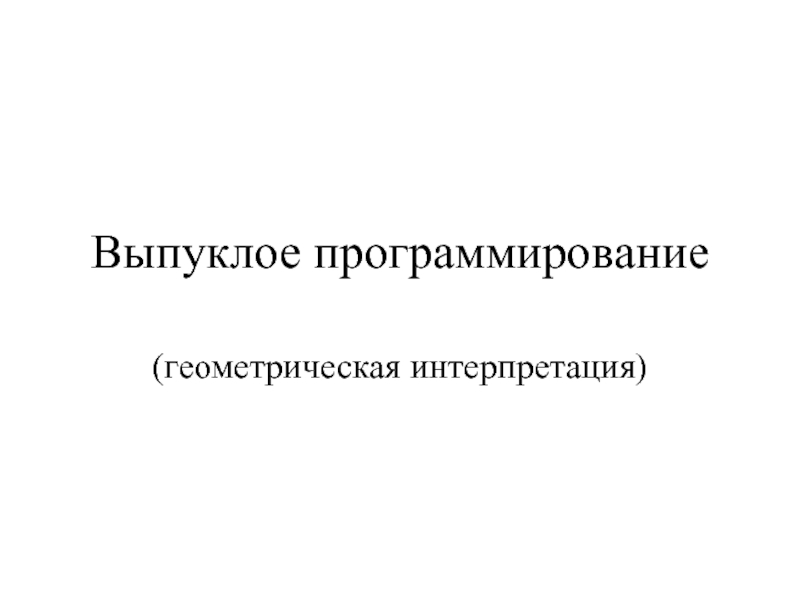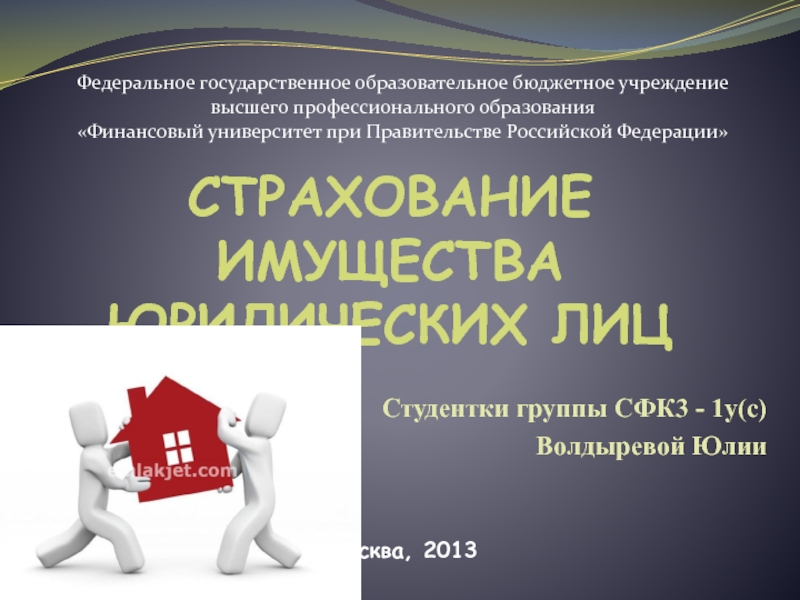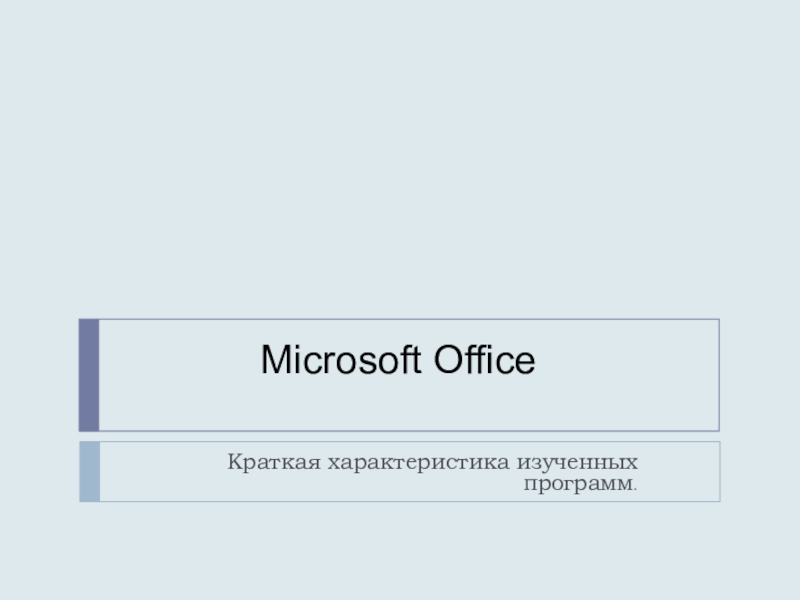Разделы презентаций
- Разное
- Английский язык
- Астрономия
- Алгебра
- Биология
- География
- Геометрия
- Детские презентации
- Информатика
- История
- Литература
- Математика
- Медицина
- Менеджмент
- Музыка
- МХК
- Немецкий язык
- ОБЖ
- Обществознание
- Окружающий мир
- Педагогика
- Русский язык
- Технология
- Физика
- Философия
- Химия
- Шаблоны, картинки для презентаций
- Экология
- Экономика
- Юриспруденция
Основы программирования ФИСТ 1 курс Власенко Олег Федосович
Содержание
- 1. Основы программирования ФИСТ 1 курс Власенко Олег Федосович
- 2. Тип charchar – это «очень короткий» целый
- 3. Тип char (2)char – это символьный тип#include
- 4. Тип char (3)unsigned char = [0 ..
- 5. Тип char (4)signed char = [-128 ..
- 6. Тип char (5)Загадка:Тип char == signed char ИЛИТип char == unsigned char ?
- 7. Тип char (6)http://stackoverflow.com/questions/2054939/is-char-signed-or-unsigned-by-defaultThe standard does not specify if plain char is signed or unsigned…
- 8. ASCIIhttps://ru.wikipedia.org/wiki/ASCIIASCII (англ. American standard code for information interchange) —
- 9. ASCIIZhttp://stackoverflow.com/questions/7783044/whats-the-difference-between-asciiz-vs-ascii In computing, a C string is
- 10. null-terminated string void main() { char s1[8] =
- 11. Инициализация строки как массива символовvoid main() { char
- 12. Инициализация строки как строкиvoid main() { char s2[]
- 13. Простейшие алгоритмы обработки строк (как массива
- 14. Используем функции из ctype.hВсе цифры заменить на
- 15. Используем функции из ctype.hВсе ????? заменить на
- 16. Используем функции из ctype.hВсе ????? заменить на
- 17. Используем функции из ctype.hВсе ????? заменить на
- 18. Используем функции из ctype.hВсе ????? заменить на
- 19. Используем функции из ctype.hВсе ????? заменить на
- 20. Используем функции из ctype.hВсе ????? заменить на
- 21. Стандартные функции обработки строкstrlen(s) - Возвращает длину
- 22. strlen()#include void main() { char s[10] = "Hi!"; printf("len
- 23. strlen()#include void main() { char s[10] = "Hi!"; printf("len
- 24. Сравнение строк – НЕ ДЕЛАЙТЕ ТАК НИКОГДА!!!void
- 25. Сравнение строк через strcmpint strcmp(const char *str1,
- 26. Сравнение строк через strcmpvoid main() { char s1[]
- 27. Копирование строкvoid main() { char src[] = "Button"; char
- 28. Конкатенация строкvoid main() { char src[] = "Button"; char
- 29. Еще раз - int strlen(char s[])int strlen(char
- 30. Собственная реализация strlenint strlen_my(char s[]) { int len; … return
- 31. Собственная реализация strlenint strlen_my(char s[]){ int len = 0; while (s[len] != '\0‘) len++; return len;}
- 32. [Домашнее] заданиеНаписать собственную версию strcpy_my(dest, src) Написать собственную версию strcat(dest, src)
- 33. Скачать презентанцию
Тип charchar – это «очень короткий» целый тип#include void main() { char ch = 32; while (ch < 127) { printf("%d ", ch); ch++; }}
Слайды и текст этой презентации
Слайд 2Тип char
char – это «очень короткий» целый тип
#include
void main()
{
char ch = 32;
while (ch < 127) {
printf("%d ", ch);
ch++;
}
}
Слайд 3Тип char (2)
char – это символьный тип
#include
void main() {
char
ch = 32;
while (ch < 127) {
printf("%c ", ch);
ch++;
}
}
Слайд 4Тип char (3)
unsigned char = [0 .. 255]
#include
void main()
{
unsigned char ch = 0;
while (ch < 255) {
printf("%c ",
ch);ch++;
}
}
Слайд 5Тип char (4)
signed char = [-128 .. +127]
#include
void main()
{
signed char ch = -128;
while (ch < 127) {
printf("%c ",
ch);ch++;
}
}
Слайд 7Тип char (6)
http://stackoverflow.com/questions/2054939/is-char-signed-or-unsigned-by-default
The standard does not specify if plain char
is signed or unsigned…
Слайд 8ASCII
https://ru.wikipedia.org/wiki/ASCII
ASCII (англ. American standard code for information interchange) — название таблицы (кодировки,
набора), в которой некоторым распространённым печатным и непечатным символам сопоставлены
числовые коды. Таблица была разработана и стандартизована в США в 1963 году.Слайд 9ASCIIZ
http://stackoverflow.com/questions/7783044/whats-the-difference-between-asciiz-vs-ascii
In computing, a C string is a character sequence
terminated with a null character ('\0', called NUL in ASCII).
It is usually stored as one-dimensional character array.[dubious – discuss] The name refers to the C programming language which uses this string representation. Alternative names are ASCIIZ (note that C strings do not imply the use of ASCII) and null-terminated stringСлайд 10null-terminated string
void main() {
char s1[8] = "Hi!\n";
int i;
for (i
= 0; i < 8; i++) {
printf("%c(%d), ", s1[i], s1[i]);
}
}
Слайд 11Инициализация строки как массива символов
void main() {
char s1[8] = {
'H', 'i', '!', '\n', '\0' };
int i;
for (i = 0;
i < 8; i++) {printf("%c(%d), ", s1[i], s1[i]);
}
}
Слайд 12Инициализация строки как строки
void main() {
char s2[] = "%c(%d), ";
int
i;
for (i = 0; i < 12; i++) {
printf("%c(%d), ",
s2[i], s2[i]);}
}
Слайд 13Простейшие алгоритмы обработки строк (как массива символов с ‘\0’ в
конце)
Все цифры заменить на символ «#»
#include
void main() {
char s3[]
= "I have 32 USD and 5 EUR!";printf("s3 = %s\n", s3);
int i = 0;
while (s3[i] != '\0') {
if (s3[i] >= '0' && s3[i] <= '9') {
s3[i] = '#';
}
i++;
}
printf("s3 = %s\n", s3);
}
Слайд 14Используем функции из ctype.h
Все цифры заменить на символ «#»
#include
#include
void main() {
char s3[] = "I have 32 USD and
5 EUR!";printf("s3 = %s\n", s3);
int i = 0;
while (s3[i] != '\0') {
if (isdigit(s3[i])) {
s3[i] = '#';
}
i++;
}
printf("s3 = %s\n", s3);
}
Слайд 15Используем функции из ctype.h
Все ????? заменить на символ «#»
void main()
{
char s3[] = "I have 32 USD and 5 EUR!";
printf("s3
= %s\n", s3);int i = 0;
while (s3[i] != '\0') {
if (isalpha(s3[i])) {
s3[i] = '#';
}
i++;
}
printf("s3 = %s\n", s3);
}
Слайд 16Используем функции из ctype.h
Все ????? заменить на символ «#»
void main()
{
char s3[] = "I have 32 USD and 5 EUR!";
printf("s3
= %s\n", s3);int i = 0;
while (s3[i] != '\0') {
if (isspace(s3[i])) {
s3[i] = '#';
}
i++;
}
printf("s3 = %s\n", s3);
}
Слайд 17Используем функции из ctype.h
Все ????? заменить на символ «#»
void main()
{
char s3[] = "I have 32 USD and 5 EUR!";
printf("s3
= %s\n", s3);int i = 0;
while (s3[i] != '\0') {
if (isupper(s3[i])) {
s3[i] = '#';
}
i++;
}
printf("s3 = %s\n", s3);
}
Слайд 18Используем функции из ctype.h
Все ????? заменить на символ «#»
void main()
{
char s3[] = "I have 32 USD and 5 EUR!";
printf("s3
= %s\n", s3);int i = 0;
while (s3[i] != '\0') {
if (islower(s3[i])) {
s3[i] = '#';
}
i++;
}
printf("s3 = %s\n", s3);
}
Слайд 19Используем функции из ctype.h
Все ????? заменить на ??????
void main() {
char
s3[] = "I have 32 USD and 5 EUR!";
printf("s3 =
%s\n", s3);int i = 0;
while (s3[i] != '\0') {
s3[i] = toupper(s3[i]);
i++;
}
printf("s3 = %s\n", s3);
}
Слайд 20Используем функции из ctype.h
Все ????? заменить на ??????
void main() {
char
s3[] = "I have 32 USD and 5 EUR!";
printf("s3 =
%s\n", s3);int i = 0;
while (s3[i] != '\0') {
s3[i] = tolower(s3[i]);
i++;
}
printf("s3 = %s\n", s3);
}
Слайд 21Стандартные функции обработки строк
strlen(s) - Возвращает длину строки без завершающей
литеры '\0'.
strcmp(s1, s2) – посимвольное сравнение строк (НЕЛЬЗЯ сравнивать строки
так «s1 == s2» или «s1 < s2»!!!)
strcpy (dest, src) – копирует сроку src в dest, включая завершающий ‘\0’
strcat (dest, src) – добавляет копию src в конец dest
И еще около 20 функций из string.h
Слайд 22strlen()
#include
void main() {
char s[10] = "Hi!";
printf("len = %d\n", strlen(s));
s[3]
= ' '; s[4] = '\0';
printf("len = %d\n", strlen(s));
s[4] =
'W'; s[5] = 'o'; s[6] = 'r'; s[7] = 'l'; s[8] = 'd'; s[9] = '\0';
printf("len = %d\n", strlen(s));
}
![Основы программирования ФИСТ 1 курс Власенко Олег Федосович strlen()#include void main() { char s[10] =](/img/tmb/4/352318/f4f9cf35099f27c540fc4320de91a637-800x.jpg)
Слайд 23strlen()
#include
void main() {
char s[10] = "Hi!";
printf("len = %d\n", strlen(s));
s[3]
= ' '; s[4] = '\0';
printf("len = %d\n", strlen(s));
s[4] =
'W'; s[5] = 'o'; s[6] = 'r'; s[7] = 'l'; s[8] = 'd'; s[9] = '\0';
printf("len = %d\n", strlen(s));
}
![Основы программирования ФИСТ 1 курс Власенко Олег Федосович strlen()#include void main() { char s[10] =](/img/tmb/4/352318/3db2362e4a6bfed64321af7ecd13f7c5-800x.jpg)
Слайд 24Сравнение строк – НЕ ДЕЛАЙТЕ ТАК НИКОГДА!!!
void main() {
char s1[]
= "Button";
char s2[] = "We";
char s3[] = "Apple !!";
char *
min = s1; char * max = s1;if (s2 > max) max = s2;
if (s3 > max) max = s3;
printf("max = %s\n", max);
if (s2 < min) min = s2;
if (s3 < min) min = s3;
printf("min = %s\n", min);
}
max) max = s2; if (s3 > max) max = s3; printf("max = %s\n", max); if (s2 < min) min = s2; if (s3 < min) min = s3; printf("min = %s\n", min);}">![Основы программирования ФИСТ 1 курс Власенко Олег Федосович Сравнение строк – НЕ ДЕЛАЙТЕ ТАК НИКОГДА!!!void main() { char s1[] = Сравнение строк – НЕ ДЕЛАЙТЕ ТАК НИКОГДА!!!void main() { char s1[] =](/img/thumbs/fdddfec614ee34154c9437153046daa1-800x.jpg)
Слайд 25Сравнение строк через strcmp
strcmp(char str1[], char str2[]);
строки и возвращает целое значение, зависящее следующим образом от результата сравнения.
Значение Результат сравнения строк
Меньше нуля str1 меньше str2
Нуль str1 равен str2
Больше нуля str1 больше str2
![Основы программирования ФИСТ 1 курс Власенко Олег Федосович Сравнение строк – НЕ ДЕЛАЙТЕ ТАК НИКОГДА!!!void main() { char s1[] = Сравнение строк – НЕ ДЕЛАЙТЕ ТАК НИКОГДА!!!void main() { char s1[] =](/img/thumbs/fdddfec614ee34154c9437153046daa1-800x.jpg)
Слайд 25Сравнение строк через strcmp
int strcmp(const char *str1, const char *str2);
int
strcmp(char str1[], char str2[]);
Функция strcmp() сравнивает в лексикографическом порядке две
строки и возвращает целое значение, зависящее следующим образом от результата сравнения.Значение Результат сравнения строк
Меньше нуля str1 меньше str2
Нуль str1 равен str2
Больше нуля str1 больше str2
Слайд 26Сравнение строк через strcmp
void main() {
char s1[] = "Button";
char s2[]
= "We";
char s3[] = "Apple !!";
char * min = s1; char
* max = s1;if (strcmp(s2, max) > 0) max = s2;
if (strcmp(s2, max) > 0) max = s3;
printf("max = %s\n", max);
if (strcmp(s2, min) < 0) min = s2;
if (strcmp(s3, min) < 0) min = s3;
printf("min = %s\n", min);
}
Слайд 27Копирование строк
void main() {
char src[] = "Button";
char dest[10];
printf("src = %s,
dest = %s\n", src, dest);
strcpy(dest, src);
printf("src = %s, dest =
%s\n", src, dest);}
![Основы программирования ФИСТ 1 курс Власенко Олег Федосович Копирование строкvoid main() { char src[] = Копирование строкvoid main() { char src[] =](/img/tmb/4/352318/cda9e915f1642dd8a793b37c5bce8734-800x.jpg)
Слайд 28Конкатенация строк
void main() {
char src[] = "Button";
char dest[10] = "";
printf("src
= %s, dest = %s\n", src, dest);
strcat(dest, src);
printf("src = %s,
dest = %s\n", src, dest);strcat(dest, "!");
printf("src = %s, dest = %s\n", src, dest);
}
Слайд 29Еще раз - int strlen(char s[])
int strlen(char s[]) {
int len;
…
return
len;
}
Возвращает длину строки без завершающей литеры '\0'.
Пример:
strlen(“!!”) == 2
strlen(“Hi!\n”) ==4
Слайд 30Собственная реализация strlen
int strlen_my(char s[]) {
int len;
…
return len;
}
Нужно написать код
функции strlen_my(s), работающей аналогично strlen(s)
Пример использования:
strlen_my(“!!”) == 2
strlen_my(“Hi!\n”) ==4
Слайд 31Собственная реализация strlen
int strlen_my(char s[])
{
int len = 0;
while (s[len] !=
'\0‘)
len++;
return len;
}
Слайд 32[Домашнее] задание
Написать собственную версию strcpy_my(dest, src)
Написать собственную версию
strcat(dest, src)
Обратная связь
Если не удалось найти и скачать доклад-презентацию, Вы можете заказать его на нашем сайте. Мы постараемся найти нужный Вам материал и отправим по электронной почте. Не стесняйтесь обращаться к нам, если у вас возникли вопросы или пожелания:
Email: Нажмите что бы посмотреть
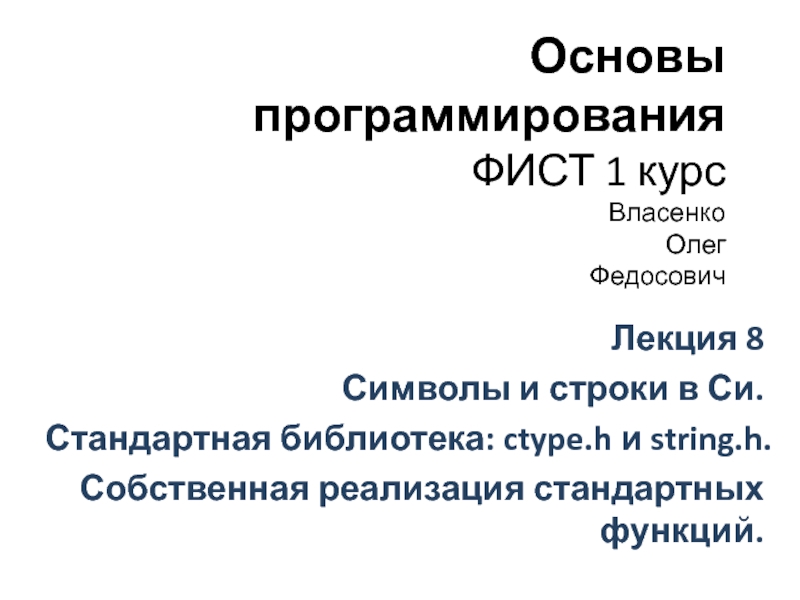
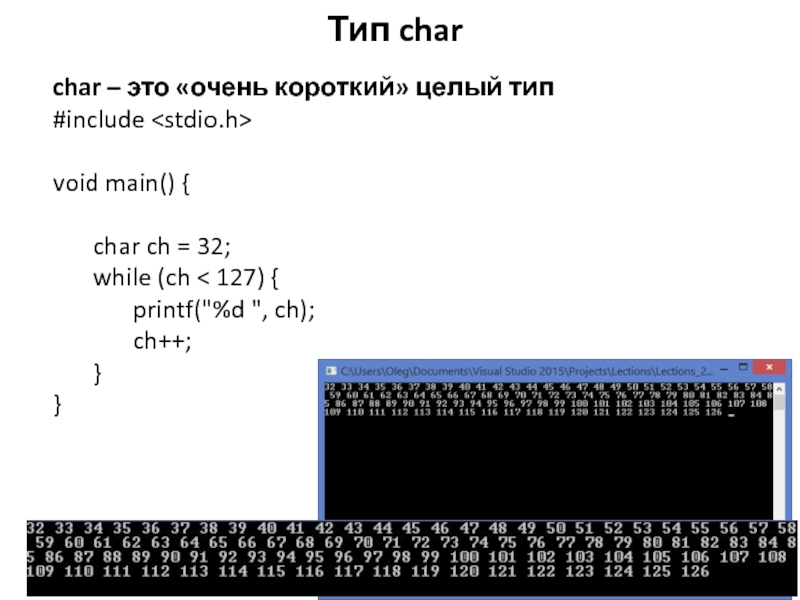
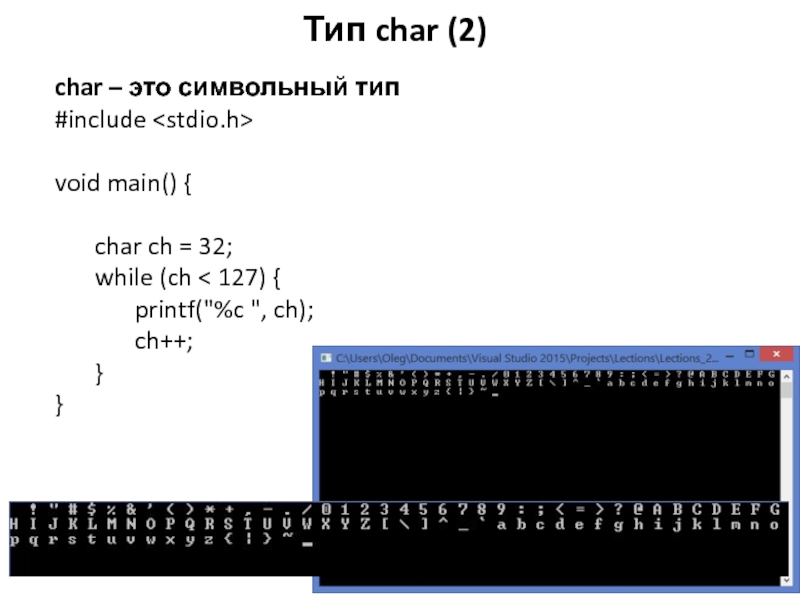
![Основы программирования ФИСТ 1 курс Власенко Олег Федосович Тип char (3)unsigned char = [0 .. 255]#include void main() { unsigned Тип char (3)unsigned char = [0 .. 255]#include void main() { unsigned char ch = 0; while (ch <](/img/tmb/4/352318/87fdbcd773170a985da180a4eb292661-800x.jpg)
![Основы программирования ФИСТ 1 курс Власенко Олег Федосович Тип char (4)signed char = [-128 .. +127]#include void main() { signed Тип char (4)signed char = [-128 .. +127]#include void main() { signed char ch = -128; while (ch <](/img/thumbs/95bcf4e97e09d1899c57b1534e5584c5-800x.jpg)
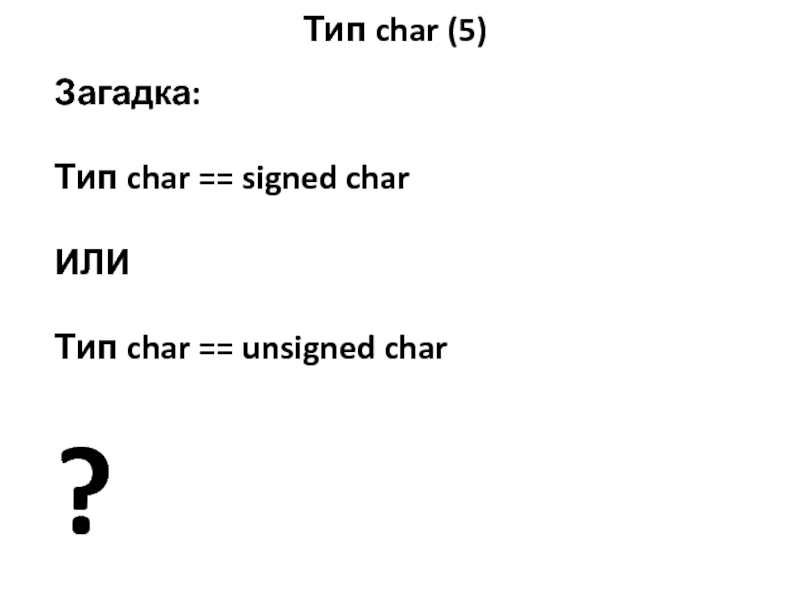
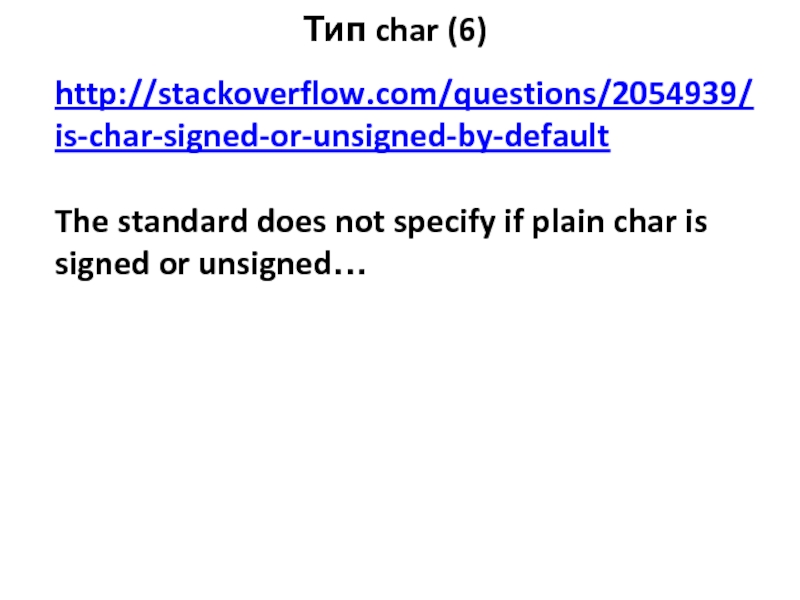
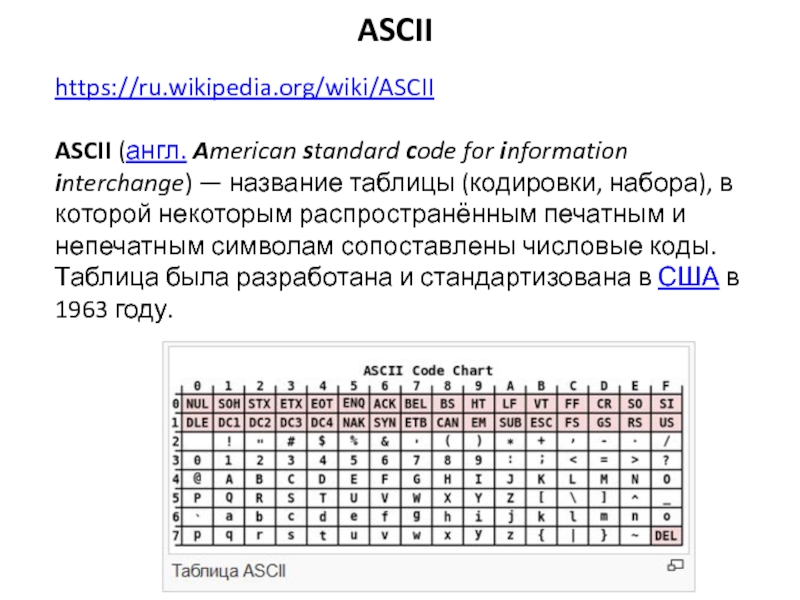
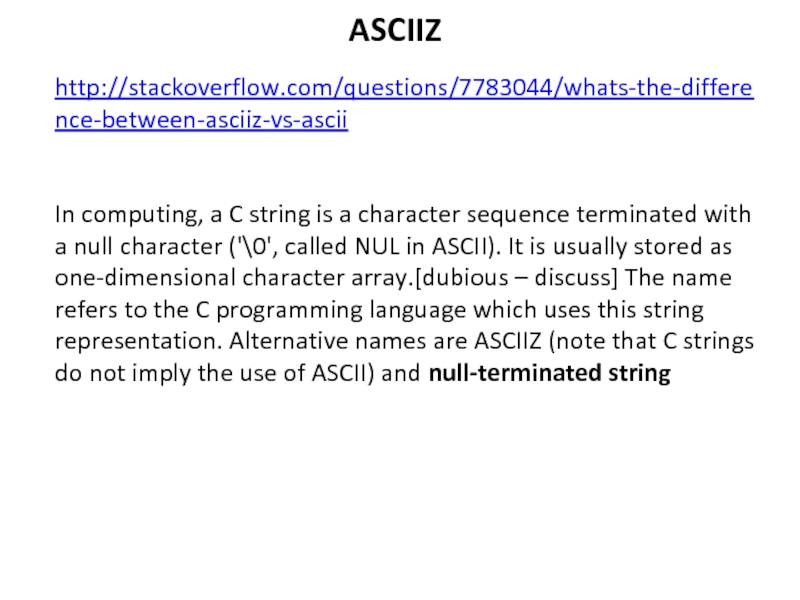
![Основы программирования ФИСТ 1 курс Власенко Олег Федосович null-terminated string void main() { char s1[8] =](/img/thumbs/2aee5aed91643484a3fb5c9dccd3a097-800x.jpg)
![Основы программирования ФИСТ 1 курс Власенко Олег Федосович Инициализация строки как массива символовvoid main() { char s1[8] = { 'H', Инициализация строки как массива символовvoid main() { char s1[8] = { 'H', 'i', '!', '\n', '\0' }; int i; for](/img/thumbs/79dda3ca1bc1b35e05ecf25e1ce13acf-800x.jpg)
![Основы программирования ФИСТ 1 курс Власенко Олег Федосович Инициализация строки как строкиvoid main() { char s2[] = Инициализация строки как строкиvoid main() { char s2[] =](/img/tmb/4/352318/4653c52a1f14a4575f57426c694d6590-800x.jpg)
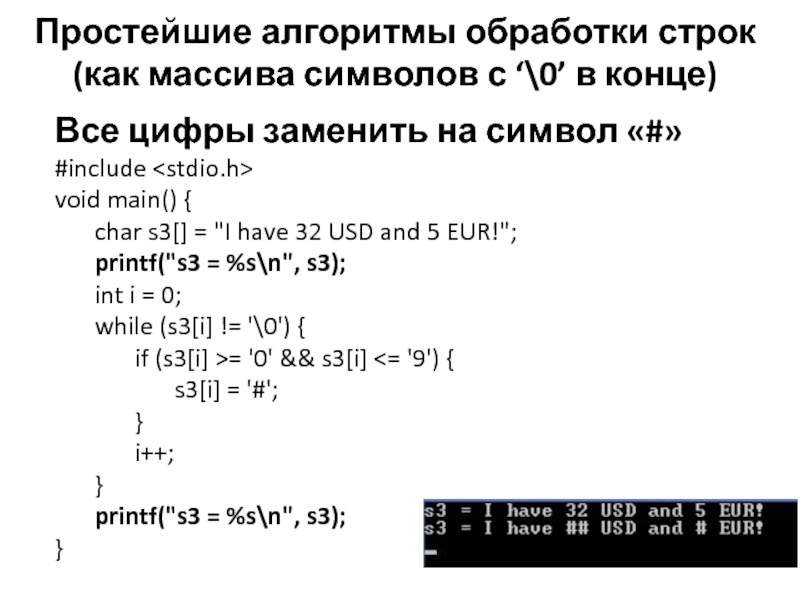
![Основы программирования ФИСТ 1 курс Власенко Олег Федосович Используем функции из ctype.hВсе цифры заменить на символ «#»#include #include void Используем функции из ctype.hВсе цифры заменить на символ «#»#include #include void main() { char s3[] =](/img/tmb/4/352318/3b7c94ccabaf63a750666999126f7818-800x.jpg)
![Основы программирования ФИСТ 1 курс Власенко Олег Федосович Используем функции из ctype.hВсе ????? заменить на символ «#»void main() { char Используем функции из ctype.hВсе ????? заменить на символ «#»void main() { char s3[] =](/img/tmb/4/352318/a0ba0d299b973ff69122259bf0bd504b-800x.jpg)
![Основы программирования ФИСТ 1 курс Власенко Олег Федосович Используем функции из ctype.hВсе ????? заменить на символ «#»void main() { char Используем функции из ctype.hВсе ????? заменить на символ «#»void main() { char s3[] =](/img/thumbs/bdd6d2b936a60ddbfbe2cc31ec2193f0-800x.jpg)
![Основы программирования ФИСТ 1 курс Власенко Олег Федосович Используем функции из ctype.hВсе ????? заменить на символ «#»void main() { char Используем функции из ctype.hВсе ????? заменить на символ «#»void main() { char s3[] =](/img/tmb/4/352318/550e42b8b5096c3069dcd01ea2eb9674-800x.jpg)
![Основы программирования ФИСТ 1 курс Власенко Олег Федосович Используем функции из ctype.hВсе ????? заменить на символ «#»void main() { char Используем функции из ctype.hВсе ????? заменить на символ «#»void main() { char s3[] =](/img/tmb/4/352318/f875e594ae70e55808887c1ccddf4518-800x.jpg)
![Основы программирования ФИСТ 1 курс Власенко Олег Федосович Используем функции из ctype.hВсе ????? заменить на ??????void main() { char s3[] Используем функции из ctype.hВсе ????? заменить на ??????void main() { char s3[] =](/img/thumbs/0e8f90c04ffb6e077c59fd48f96ee0a8-800x.jpg)
![Основы программирования ФИСТ 1 курс Власенко Олег Федосович Используем функции из ctype.hВсе ????? заменить на ??????void main() { char s3[] Используем функции из ctype.hВсе ????? заменить на ??????void main() { char s3[] =](/img/tmb/4/352318/04d61b0968d9331476c7e21d21c7509e-800x.jpg)
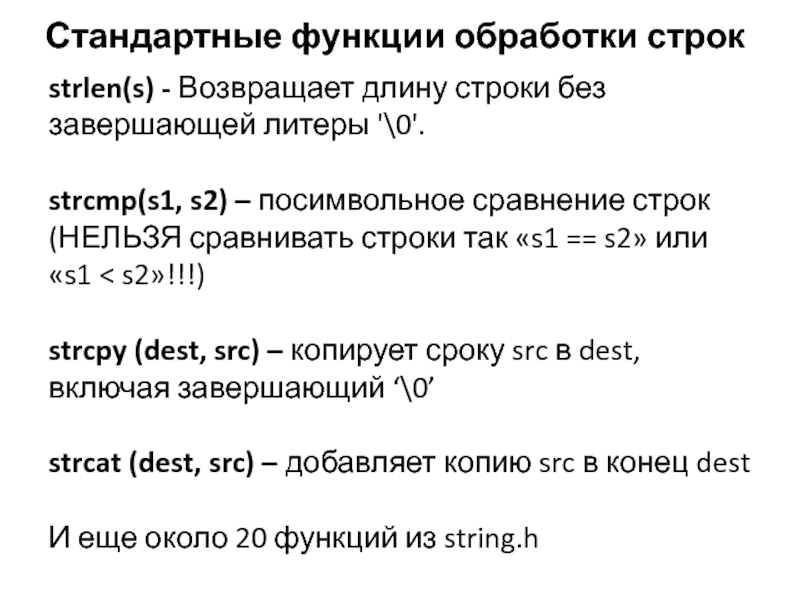
![Основы программирования ФИСТ 1 курс Власенко Олег Федосович Сравнение строк через strcmpint strcmp(const char *str1, const char *str2);int strcmp(char Сравнение строк через strcmpint strcmp(const char *str1, const char *str2);int strcmp(char str1[], char str2[]);Функция strcmp() сравнивает в](/img/tmb/4/352318/bf59e5c27b35f0759c361caa6139e06a-800x.jpg)
![Основы программирования ФИСТ 1 курс Власенко Олег Федосович Сравнение строк через strcmpvoid main() { char s1[] =](/img/thumbs/56352cbbe62b87215381627e2a2347dd-800x.jpg)
![Основы программирования ФИСТ 1 курс Власенко Олег Федосович Конкатенация строкvoid main() { char src[] =](/img/thumbs/e6a6b2b3180c0e55588075c4f5be7b6c-800x.jpg)
![Основы программирования ФИСТ 1 курс Власенко Олег Федосович Еще раз - int strlen(char s[])int strlen(char s[]) { int len; … return len;}Возвращает Еще раз - int strlen(char s[])int strlen(char s[]) { int len; … return len;}Возвращает длину строки без завершающей литеры '\0'.Пример:strlen(“!!”)](/img/tmb/4/352318/72ba1bf09563cc4aeac0c36a3b654e8e-800x.jpg)
![Основы программирования ФИСТ 1 курс Власенко Олег Федосович Собственная реализация strlenint strlen_my(char s[]) { int len; … return len;}Нужно написать код функции Собственная реализация strlenint strlen_my(char s[]) { int len; … return len;}Нужно написать код функции strlen_my(s), работающей аналогично strlen(s)Пример использования:strlen_my(“!!”) ==](/img/tmb/4/352318/b71e0c61ea658da25adba63a1518ad29-800x.jpg)
![Основы программирования ФИСТ 1 курс Власенко Олег Федосович Собственная реализация strlenint strlen_my(char s[]){ int len = 0; while (s[len] != '\0‘) len++; return len;} Собственная реализация strlenint strlen_my(char s[]){ int len = 0; while (s[len] != '\0‘) len++; return len;}](/img/tmb/4/352318/f8d43cb8c52c8d88e574c2ff7b306085-800x.jpg)
![Основы программирования ФИСТ 1 курс Власенко Олег Федосович [Домашнее] заданиеНаписать собственную версию strcpy_my(dest, src) Написать собственную версию strcat(dest, src) [Домашнее] заданиеНаписать собственную версию strcpy_my(dest, src) Написать собственную версию strcat(dest, src)](/img/tmb/4/352318/5d92557ea847fd64eefca6af30452f09-800x.jpg)
